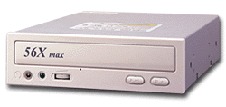 |
|
Here
are the topics we'll discuss:
|
 |
|
Hard
Drive: This is the PC's "central
repository," where startup files, the
operating system, data and programs (software) are
stored.
|
 |

|
Storage
capacity is measured in gigabytes (GB), with a GB* being
equal to a thousand MB. Again, bigger is better, and many
PCs now come with "monster" hard drives of 60 to
600 GB. As we mentioned, the size of your hard drive will
depend on the kind of things to be stored. Music, graphics
and video, for example, can take up a great deal of space.
|
|

|
 |
Floppy
Disk: This is the unsung hero, the "old
reliable" storage system that is often overlooked by
users of today's super-fast, large-capacity PCs. This is a
3.5" square disk that holds about 1.44 MB of data,
and is easy to use. Consider it standard equipment on your
new PC.
|
|
|
|
USB Flash drives are taking the place of most
Floppy Drives today. The Flash Drive is smaller more
portable and can hold a lot more Data. Flash Drives can be
any size most common is from 512Mb to 4Gb of memory space. |
Other
types of storage:
|
CD-ROM:
Many PCs also come with a CD-ROM (compact disk,
read-only-memory) as standard equipment. CD-ROM speed is
measured by its "X" number, so a 48X max drive
is faster than a 32X max drive. When you see the
designation "32X/48X," you're looking at the
range of speeds available on that particular drive. Most
software programs and a great deal of material are now
offered on CD-ROM, since it offers so much more storage
capacity than a floppy disk. For example, while the data
capacity of a floppy is 1.44MB, a CD-ROM will hold 650MB
of data.
|
 |

|
CD-RW:
The "RW" stands for "Read/Write." In addition
to playing or reading CDs, this drive can "write" or
create them as well, using special writeable CD blanks. This is an
ideal upgrade from a standard CD-ROM since it can come in very
handy for storing large amounts of data without using up valuable
hard drive space. One of the primary uses of this is to burn music
files. It's also an ideal way to backup valuable data and to
transport and/or share large amounts of "static" data
(files that will not need to be updated multiple times) between
computers.
DVD:
Reads CD-ROMs with the added benefit of being able to play DVD
data, such as movies, on the PC. NOTE: if you plan to use a DVD
to view movies, you will need an MPEG decoder card. DVD RW can
also burn DVDs or CDs. Burn speed is also measured by its "X"
number.
ZIP® :
While a floppy disk holds 1 MB of data, a ZIP can hold 100 MB, 250
MB and soon, 500 MB on special cartridges; think of it as a small,
removable hard drive. The flash drive has rendered the need for
Zip drives mostly obsolete.
You may want
to consider a CD-ROM with a Flash Drive or a CD-RW or DVD/RW as the
extra/portable storage functions for your new PC.
1
For hard drives, GB means 1 billion bytes; accessible capacity
varies with operating environment.
|
![]()

![]()
![]()
![]()

![]()
![]()